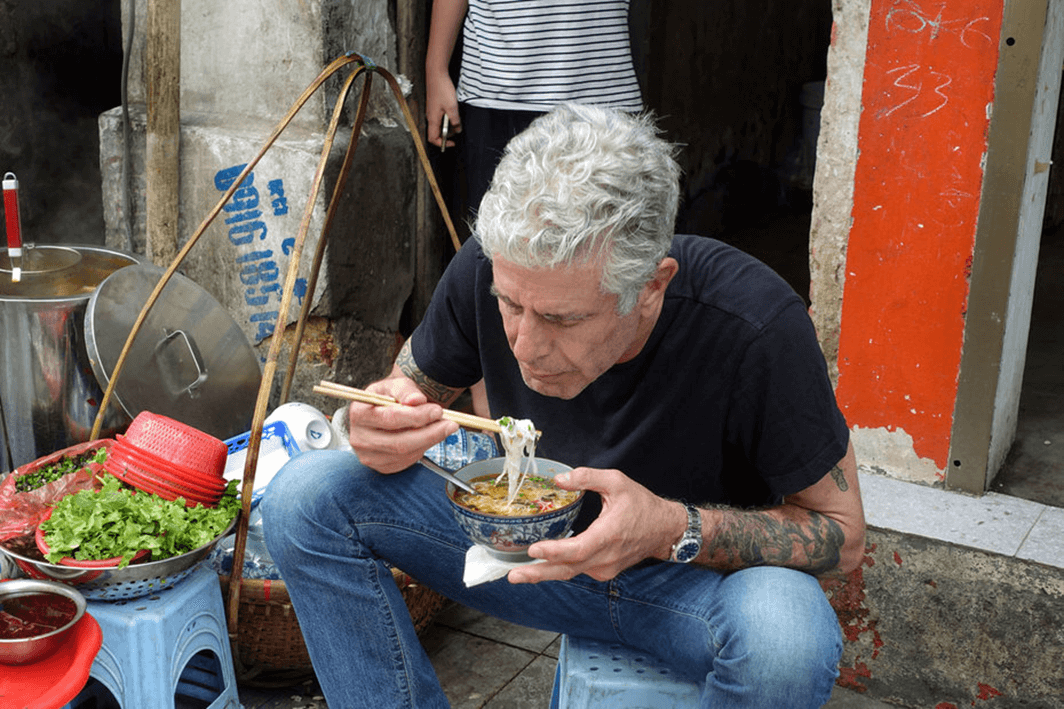
I’d hoped to finish at least one more skating post before writing another off-topic piece, but Job Hell has extended into June. Also, one of my heroes died, and I think it would piss him off if I didn’t grieve in public.
Anthony Bourdain died by suicide this morning. It was one of those sad non-surprises: a moment of shock followed by a long, slow, “Yeah, I guess,” as the energy wrung out of me like sludgy water from a dish towel. Bourdain had a history of substance abuse and mental health struggles. He survived a lot of rounds before losing this one.
It was that sense of living on the precipice – between embracing life and rejecting it, between enthusiasm and cynicism – that gave Bourdain his voice. He loved food and had devoted his life to it; there was no purer expression of joy on television than Bourdain biting into something delicious. The air he gave off, of being skeptical and tired of most of what the world had to offer, made his moments of wonder feel unique and earned. If Bourdain liked something, you believed it was special.
Bourdain also delighted in hating what he hated. He saved a bitter place in his heart for vegetarians:
Vegetarians, and their Hezbollah-like splinter faction, the vegans, are a persistent irritant to any chef worth a damn. To me, life without veal stock, pork fat, sausage, organ meat, demi-glace or even stinky cheese is a life not worth living. Vegetarians are the enemy of everything good and decent in the human spirit, an affront to all I stand for, the pure enjoyment of food. (Kitchen Confidential p. 70).
I didn’t eat any red meat or poultry when I first read Kitchen Confidential, and I still eat very little meat compared to most Americans. While my reasons for falling off the vegetarian wagon had mostly to do with an iron absorption problem, Bourdain was instrumental in making me feel okay with eating the occasional warm-blooded animal. His problem with vegetarians – and, indeed, his problem with most of the food habits he derided – was willful self-deprivation in a world where joy and wonder were already in too short a supply.
When I started writing about figure skating, I looked to Bourdain as an example of how to strike that balance between cynicism and pleasure. My background in the sport – as a child who participated and as an adult who armchair quarterbacks vociferously – reflected a lifelong love, but also a frustration with everything from judging practices to gender policing. I learned from Bourdain that even when I am expressing urgent rage and despair, there are ways to let my fierce love for the sport shine through as the reason for those strong emotions.
Bourdain has also taught me how to embrace kitsch, and to let go of the idea of any pleasure as guilty. In an interview with Conan O’Brien, he talked giddily about sneaking to KFC for tubs of mac and cheese, and compared the experience to renting porn videos. What’s unsaid here is, when he got recognized on his way out of a fast food joint, it was by other people who felt vaguely guilty about wanting a tub of salty fake cheese. The fact is, that stuff is as satisfying in its way as the cheese cart at a high-end restaurant in France. In fact, as he wrote in The Nasty Bits:
The ultimate New York dining experience, however, may not be in a restaurant at all. For me, it’s a rainy, lazy night at home in my apartment. I’ll smoke a fat spliff, lay out some old newspapers on the bed, and call out for Chinese. I’ll eat directly out of that classic New York vessel, the white cardboard takeout container, and watch a rented movie. . . Food never tastes better (p. 80).
I embrace this attitude when I write about my favorite skating performances, especially when I know they’re programs or athletes that other skating fans roll their eyes at. There are skating fans who try to enforce a sort of artistic purity on fan culture, deriding anything funny or campy as lacking in artistry. But there’s room on the palate for both, and we do ourselves a disservice when we dismiss certain types of meals or performances or experiences out of hand.
One troubling thing for me is that Bourdain is the second of my nonfiction-writing heroes to die as a result of depression. This September will mark the ten-year anniversary of David Foster Wallace’s death, a loss that hit me sufficiently hard that I taught an all-Wallace semester of freshman composition the following spring. (It has subsequently come out that Wallace was probably abusive toward several of his romantic partners, which is the kind of revision on history that I can’t overlook, but it would also be dishonest to let that diminish the influence that his writing has had on mine.) We also lost one of my favorite musicians, Scott Hutchinson of Frightened Rabbit, earlier this year. This pattern makes me look inward, toward my own efforts to keep my mental health stable, to remind myself that of the organs in my body, my brain is my biggest threat, too.
Yesterday, on the way back from an errand in the suburbs (my parents have a squirrel problem in their attic, David Sedaris is not part of my nonfiction pantheon, let’s move on to the food), I stopped at Kaufman’s, which Jewish Chicagoans know is the place to get the food of our people in this town, especially when driving back into the city from the North Shore. There wasn’t much behind the decision; I was hungry from a morning of arguing with exterminators, and it was on my way. As a result, I have an uncommon bounty in my fridge: hand-cut nova lox, chopped beef liver, sliced medium-hard salami (Kaufman’s offers salami in a variety of hardnesses), a tub of chive cheese, and a bag of bagels. If this weren’t the case, I’d be hiking up to Argyle Street for some Vietnamese comfort food, but this will do better.
So, Tony, I raise this homemade salami sandwich in your memory. It’s slathered with mayo because I dare you to tell me that’s wrong. Thanks for all the beautiful stories, and for showing me how to be confident in writing about what I know best and love most.

Thank you. Great post